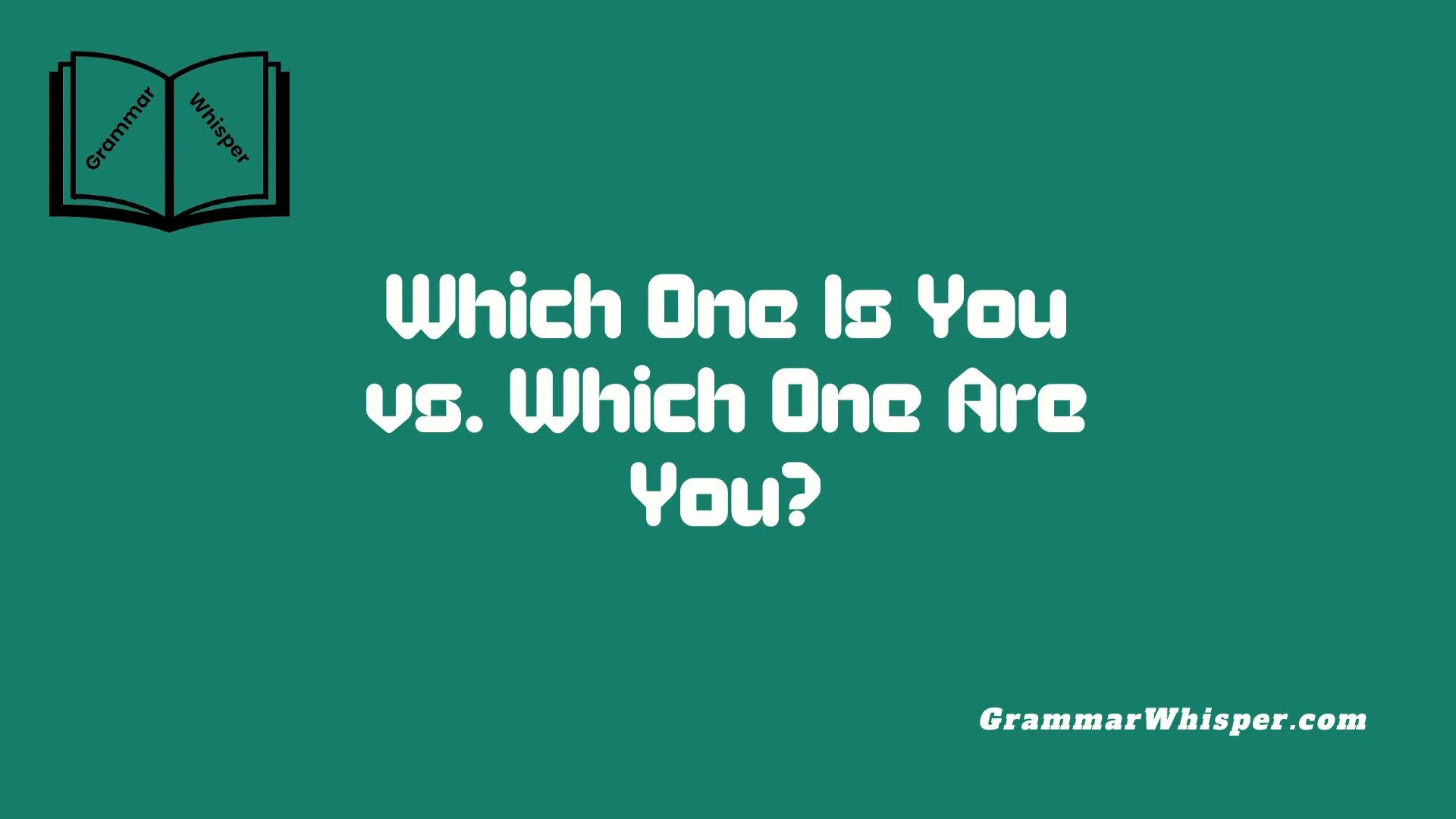English learners often hit a wall when it comes to seemingly simple choices that native speakers make without thinking. One of the tricky grammar decisions beginners face is distinguishing between the phrases “Which One Is You vs. Which One Are You.” Though they look similar, the difference between them matters – especially if you’re aiming to sound grammatically correct in both writing and conversation. I remember those early days when I kept hearing both in casual chats and wondering which was actually right. This article breaks it all down in plain, clear language so even beginners can understand the rules without confusion.
The correct phrase is “Which one are you” because you pairs with are, not is – even when referring to just one person. It’s one of those grammar facts that may not feel intuitive at first, but once you apply it in real life, it starts to make sense. The wrong version, “Which one is you,” can appear in regional dialects or informal speech, but it isn’t technically correct. When this clicked, it helped clear the fog around many similar grammar problems. Once the logic sinks in, it starts to feel more natural.
Understanding “You” in American English
The word “you” can function as both singular and plural, depending on the context. It always acts as the second-person subject pronoun in a sentence.
What makes it unique is that regardless of whether you’re talking to one person or a group, “you” always pairs with the plural verb form.
Subject-Verb Agreement with “You”
| Subject | Verb (Present Tense) | Example |
| I | am | I am going |
| He/She/It | is | She is ready |
| You | are | You are correct |
| We/They | are | They are excited |
Even when speaking to one person:
“You are my best friend.”
Not: “You is my best friend.”
This basic rule sets the foundation for why “Which one are you?” is correct.
Dissecting the Phrases: Which One Is You vs. Which One Are You
At first glance, both seem logical. After all, we say things like:
- “This is John.”
- “That is you in the photo, right?”
So why not “Which one is you?”?
Let’s break it down.
Phrase Structure Comparison
Phrase
Grammatical?
Why
Which one is you?
❌ Incorrect
“You” requires “are”; wrong subject-verb agreement
Which one are you?
✅ Correct
“You” is the subject; matches with “are”
Subject and Verb Inversion in Questions
In English, especially in questions, we often invert the subject and the auxiliary verb:
“You are the winner.” → “Are you the winner?”
“She is the teacher.” → “Is she the teacher?”
So:
- “You are one of them.” → “Which one are you?”
Not:
- “Which one is you?”
Why People Use “Which One Is You?” (Even If It’s Wrong)
You might hear people use “Which one is you?” in casual speech or informal writing. This happens for a few reasons:
1. Regional Dialects
Some dialects, especially in Southern American English or informal speech communities, may bend rules:
“Where is you going?” ❌
“Which one is you?” ❌
It’s not grammatically correct, but it’s colloquially accepted in specific regions.
2. Misleading Word Order
English question structure can sometimes confuse learners. If you’re not sure whether the subject is “you” or “which one,” you might guess wrong.
Real-Life Situations: When These Phrases Come Up
Understanding context is critical. Here are a few scenarios where you might encounter these phrases:
Group Identification
You’re in a Zoom call with ten profile pictures:
Correct: “Which one are you on the screen?”
In-Person Event or Line-Up
Security is checking badges:
Correct: “Which one are you on this list?”
Social Media Threads
Commenting on a group photo:
Correct: “Which one are you in the picture?”
Simple Grammar Rules to Remember
To avoid confusion, commit these rules to memory:
Rule 1: “You” Always Pairs with “Are”
Even when it’s singular:
“You are the one.”
Rule 2: Inverted Questions Still Follow Agreement
Statement: “You are the second one.”
Question: “Which one are you?”
Rule 3: “Is” Is for Third Person Singular
Only use “is” with he, she, it, or a singular noun:
- “Which one is Sarah?”
- “Which one is your dog?”
How to Remember the Correct Form Easily
Here are some tips that make correct usage second nature:
Use Substitution to Check
Replace “you” with another pronoun to test the structure:
- “Which one is she?” ✅
- “Which one is you?” ❌
- “Which one are you?” ✅
Create Mnemonics
Y-A-R: You Are Right
Use that as a reminder that “you” needs “are.”
Practice Common Question Forms
| Incorrect | Correct |
| Where is you? | Where are you? |
| Who is you? | Who are you? |
| Which one is you? | Which one are you? |
Try Mirror Sentences
For every sentence using “you,” write the statement and question form:
- Statement: “You are the tallest.”
- Question: “Who are you?”
Editing and Proofreading Tips for This Grammar Issue
This mistake can sneak into writing, especially dialogue or casual texts. Here’s how to catch it:
1. Read Aloud
Your ear may catch what your eyes miss. If it doesn’t sound right, it probably isn’t.
2. Use Grammar Tools
Apps like Grammarly and Hemingway highlight subject-verb agreement issues.
3. Replace “You” With Another Pronoun
Just as above, this quick swap helps you spot wrong pairings fast.
Case Study: Social Media Dialogue Gone Wrong
Scenario: Emma posts a group photo with her college friends. Jake comments:
“Which one is you?”
It sounds okay in casual speech, but it’s grammatically wrong. A better response would be:
“Which one are you in the photo?”
Why it matters: Correct grammar shows professionalism, even on informal platforms.
Pop Culture Moments: Bending Grammar for Humor or Effect
TV shows, songs, and movies sometimes use “Which one is you?” for stylistic or comedic effect.
Examples
- “Which one is you?” said in sitcoms for dramatic pause
- Song lyrics that intentionally use incorrect grammar to match rhythm or rhyme
These are exceptions, not rules. They’re used for effect, not correctness.
Expanding Beyond This One Phrase
To get more fluent with English question forms involving “you,” practice with these structures:
Similar Confusions
| Incorrect Phrase | Correct Phrase |
| Where is you? | Where are you? |
| Who is you? | Who are you? |
| What is you doing? | What are you doing? |
Bonus Phrases
- “Which are you?” ✅
- “Are you the one who…?” ✅
The key: Check the subject. If it’s “you,” use “are.”
Quick Reference Table
| Sentence | Correct or Incorrect? | Explanation |
| Which one is you? | ❌ Incorrect | “You” should be paired with “are” |
| Which one are you? | ✅ Correct | Standard subject-verb agreement |
| Who is you? | ❌ Incorrect | “You” can’t go with “is” |
| Who are you? | ✅ Correct | “Are” matches with “you” |
Final Thoughts
Small grammar points like these can make a big impact. They not only boost your credibility but also help others understand you better. Whether you’re writing a job application, texting a friend, or commenting on a photo, “Which one are you?” is the right way to ask.
Grammar doesn’t have to be stiff or scary. With a few quick rules and examples, you can speak more naturally and confidently in any setting.
FAQs
What is the correct phrase: “Which one is you” or “Which one are you”?
“Which one are you?” is the grammatically correct form. This is because “you” is a plural or singular second-person subject, and the verb “are” agrees with it. “Which one is you?” sounds incorrect to native speakers because “is” is a singular third-person verb and doesn’t agree with “you.”
Why does “are” go with “you” even when referring to one person?
In English, the pronoun “you” is used for both singular and plural second-person references. Regardless of how many people you’re addressing, “are” is always the correct verb form that follows “you.” This rule is a holdover from older English where “thou” (singular) and “ye” (plural) had different verb conjugations – but modern English has simplified this.
Can “Which one is you?” ever be acceptable in casual speech?
While “Which one is you?” might be heard in informal or dialect-heavy speech, it’s not considered correct in standard American English. People might say it in rapid conversation or regional speech patterns, but it’s still a grammatical error in formal writing or clear spoken English.
Is “Which one are you?” used in professional settings?
Yes, “Which one are you?” is perfectly acceptable in both casual and professional contexts. For example, during a video conference with blurred profile names, someone might ask, “Which one are you?” to identify a participant. It’s grammatically sound and widely used.
How can I remember when to use “are” with “you”?
A helpful tip is this: “You always go with ‘are’ – never with ‘is.’” Just like you wouldn’t say “You is going,” you shouldn’t say “Which one is you?” Here’s a mini comparison:
SubjectCorrect VerbExampleIamI am happy.YouareYou are correct.He/SheisShe is running.TheyareThey are excited.











